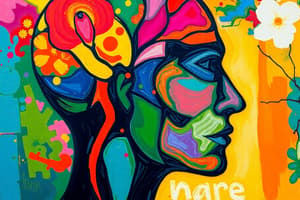Podcast
Questions and Answers
What does the natural basis of the self primarily rely on?
What does the natural basis of the self primarily rely on?
- Social institutions
- Biological processes (correct)
- Personal experiences
- Cultural influences
Which type of self is characterized as knowing both oneself and being known to others?
Which type of self is characterized as knowing both oneself and being known to others?
- Open self (correct)
- Hidden self
- Unknown self
- Blind self
Which factor emphasizes the role of significant individuals in shaping personal identity?
Which factor emphasizes the role of significant individuals in shaping personal identity?
- Hereditary factor
- Environmental factor
- Person-volition factor
- Social factor (correct)
What does the term 'tabula rasa' suggest about the human mind at birth?
What does the term 'tabula rasa' suggest about the human mind at birth?
What best describes personality in relation to individual behavior?
What best describes personality in relation to individual behavior?
Which self is characterized by traits that are unknown to oneself but known to others?
Which self is characterized by traits that are unknown to oneself but known to others?
What do hereditary factors refer to in terms of personality development?
What do hereditary factors refer to in terms of personality development?
What is implied by the term 'person-volition factor' in constructing identity?
What is implied by the term 'person-volition factor' in constructing identity?
Flashcards are hidden until you start studying
Study Notes
Nature vs. Nurture
- Nature posits that the self is shaped largely by biological processes and inherent predispositions.
- Human traits are transmitted across generations, emphasizing a biological foundation of self.
- Nurture focuses on the role of social institutions in shaping an individual's self-concept.
- At birth, the human mind is viewed as a tabula rasa, gradually developed through experiences.
Understanding Identity and Self
- Identity represents the unique character or personality that defines an individual.
- Self encompasses all personal characteristics, both understood and not understood by the individual or others.
The Self Quadrant Model
- Open Self: Characteristics known to both oneself and others.
- Hidden Self: Traits recognized by oneself but not by others.
- Blind Self: Attributes known to others but unknown to oneself.
- Unknown Self: Aspects that are neither recognized by oneself nor others.
Character and Personality
- Character is defined by mental and moral qualities that distinguish an individual, linked to one's role in life.
- Personality consists of enduring traits and unique characteristics that provide stability and individuality to behavior.
Influencing Factors on Self-Concept
- Social Factor: Refers to the impact of significant individuals in one’s life on personal development.
- Environmental Factor: Includes physical and communal influences present in an individual’s surroundings, affecting their experiences.
- Hereditary Factor: Involves biological transmission of traits and characteristics from one generation to the next.
- Person-Volition Factor: Highlights a person's intrinsic desire to develop a unique identity that differentiates them from others.
Studying That Suits You
Use AI to generate personalized quizzes and flashcards to suit your learning preferences.




